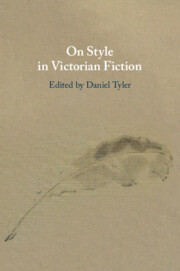Book contents
- On Style in Victorian Fiction
- On Style in Victorian Fiction
- Copyright page
- Contents
- Notes on Contributors
- Acknowledgements
- Chapter 1 On Style: An Introduction
- Part I Aspects of Style
- Part II Authors
- Chapter 7 Thackeray: Styles of Fallibility
- Chapter 8 Jane Eyre’s Style
- Chapter 9 Windburn on Planet Brontë
- Chapter 10 The Man in White: Wilkie Collins’s Styles
- Chapter 11 Fiction and the Law: Stylistic Uncertainties in Trollope’s Orley Farm
- Chapter 12 George Eliot’s Rhythms
- Chapter 13 The Late Great Dickens: Style Distilled
- Chapter 14 Meredith’s Style
- Chapter 15 Hardy and Style
- Chapter 16 Kipling; and
- Chapter 17 ‘All the unspoken’: James’s Style
- Select Bibliography
- Index
Chapter 14 - Meredith’s Style
from Part II - Authors
Published online by Cambridge University Press: 23 December 2021
- On Style in Victorian Fiction
- On Style in Victorian Fiction
- Copyright page
- Contents
- Notes on Contributors
- Acknowledgements
- Chapter 1 On Style: An Introduction
- Part I Aspects of Style
- Part II Authors
- Chapter 7 Thackeray: Styles of Fallibility
- Chapter 8 Jane Eyre’s Style
- Chapter 9 Windburn on Planet Brontë
- Chapter 10 The Man in White: Wilkie Collins’s Styles
- Chapter 11 Fiction and the Law: Stylistic Uncertainties in Trollope’s Orley Farm
- Chapter 12 George Eliot’s Rhythms
- Chapter 13 The Late Great Dickens: Style Distilled
- Chapter 14 Meredith’s Style
- Chapter 15 Hardy and Style
- Chapter 16 Kipling; and
- Chapter 17 ‘All the unspoken’: James’s Style
- Select Bibliography
- Index
Summary
Meredith’s novels abound in sentences, understood not just as the verbal form that contains a subject and a predicate, ending in a period, but as sententiae or maxims, which express a general truth or opinion in striking and memorable terms. A long-time feature of argument and rhetoric, sententiae are intimately associated with the development of oral and written prose, though their presence in Meredith’s work has led to the accusation that his novels are excessively poetic. This essay adopts a genealogical approach to Meredith’s style by tracing the development of his earliest sententiae to their recognizably mature form. With roots in the “wisdom” tradition in ancient prophecy and philosophy, Meredith’s sententiae reflect an ideal of cultivated speech historically associated with intelligent conversation and drama, which he then assimilated to narrative fiction. The singularity of the Meredithian sentence – a metaphorically dense and syntactically complex assertion that blends idiosyncratic expression with judgments of common sense – thus arises from synthetic hybridity, overlaying didacticism with description and intellection with image.
Keywords
- Type
- Chapter
- Information
- On Style in Victorian Fiction , pp. 244 - 262Publisher: Cambridge University PressPrint publication year: 2022

